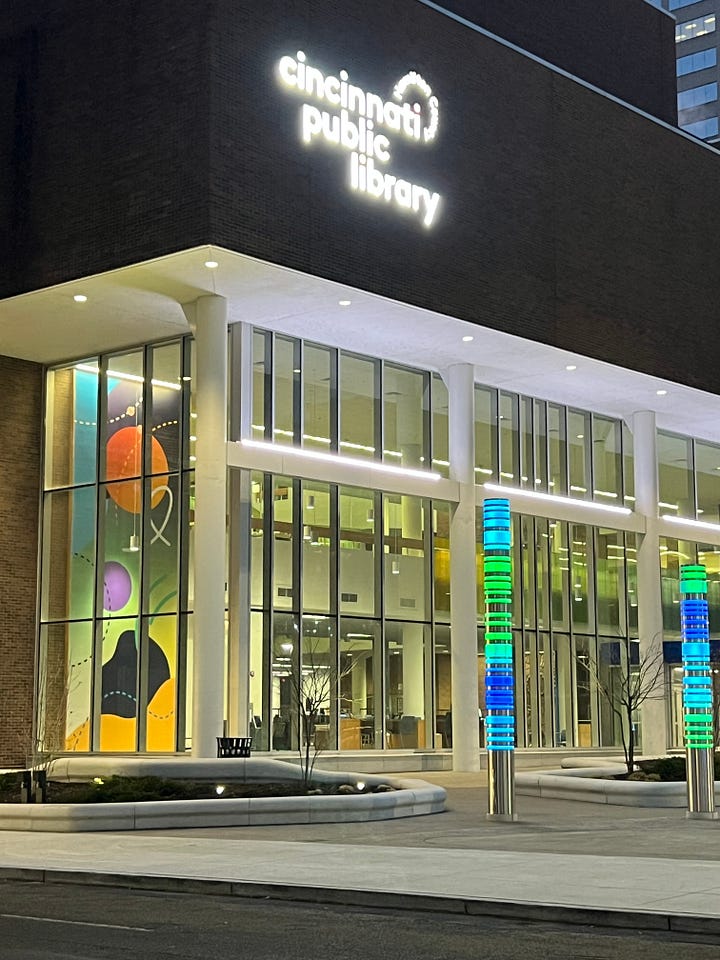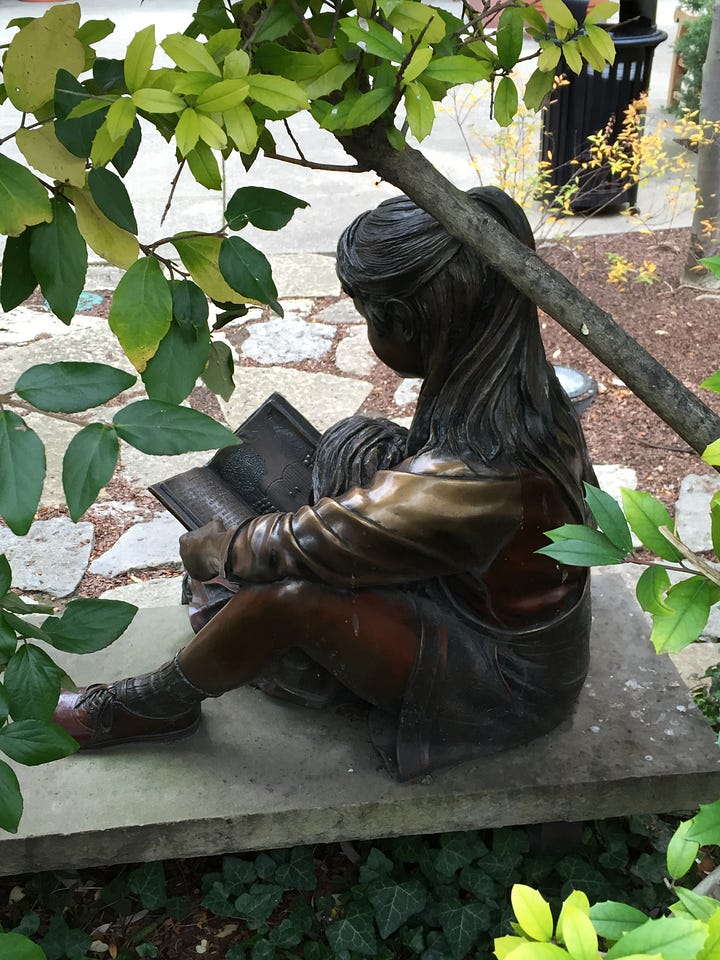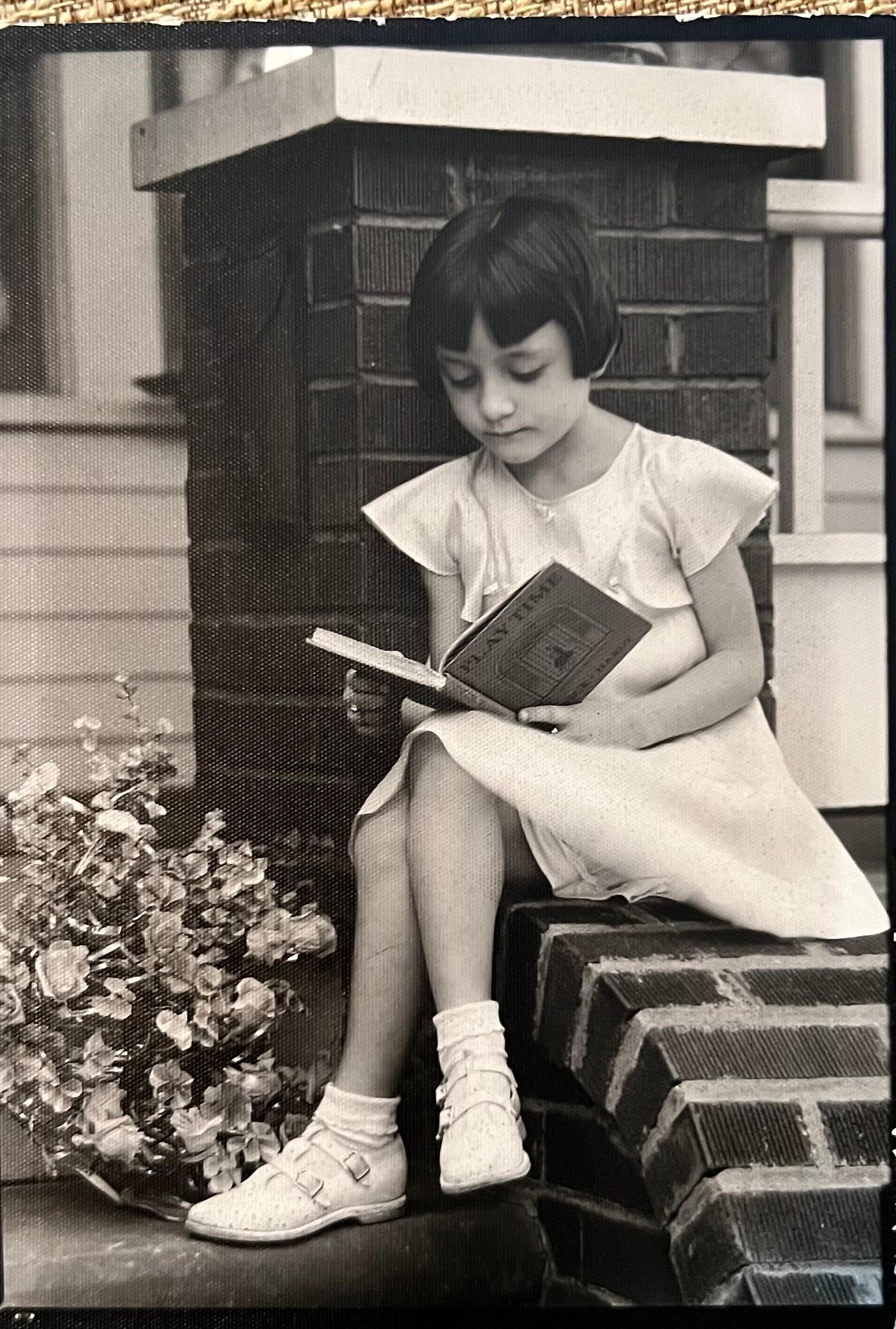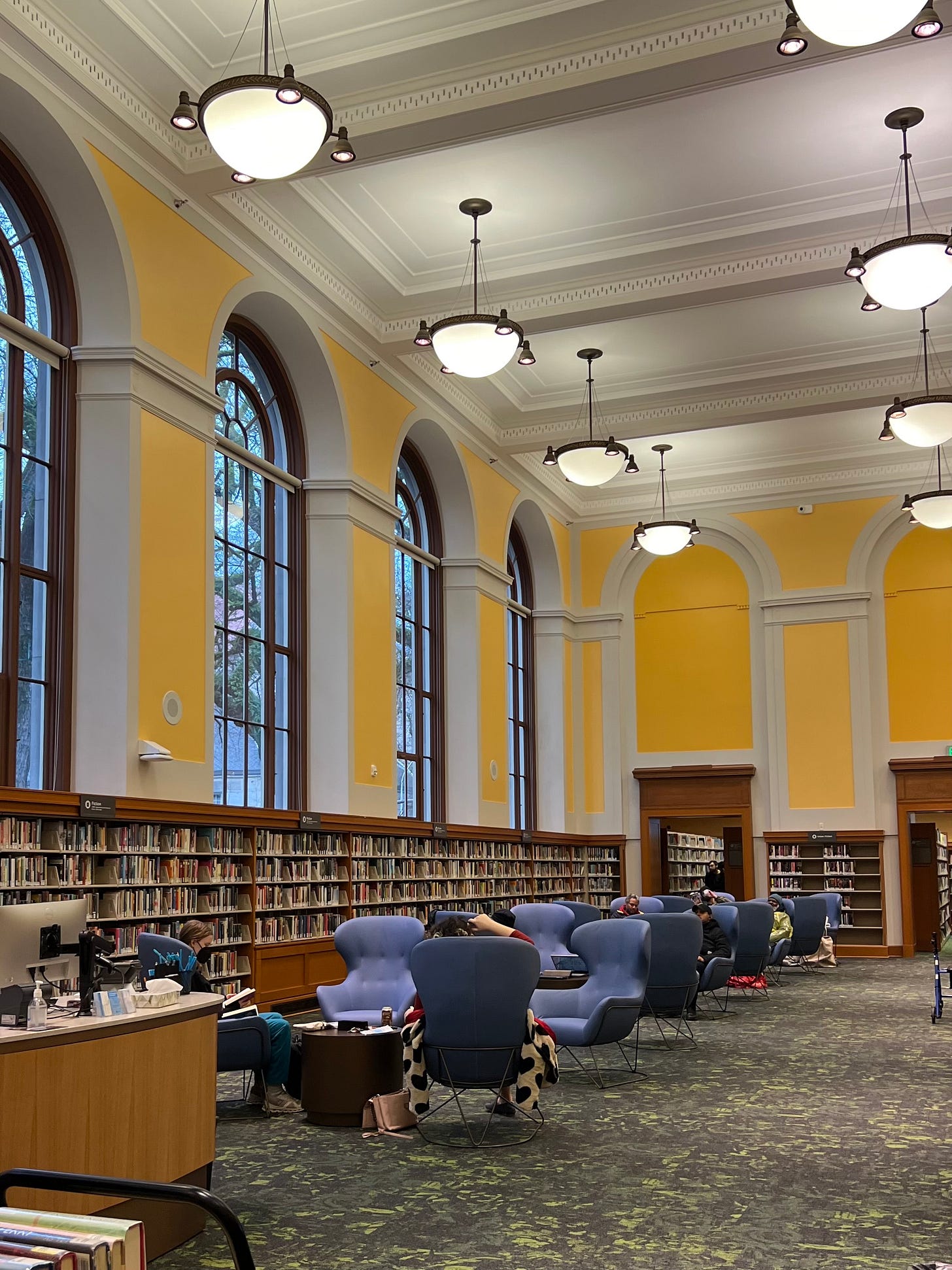By the time my son learned to read, we had moved away from our beloved Oregon and returned to Ohio. The closest library was Symmes Public Library (currently undergoing renovations), part of the Cincinnati and Hamilton County Public Library system.
After parking, I’d hold his hand through the car lot as we meandered (to be honest, he and I never meandered) up the concrete walkway past the windowed rotunda. The entrance to the library welcomed us with a quote etched into a band of limestone—and inscribed upon my heart because of our countless visits.
“Books are the treasured wealth of the world and the fit inheritance of generations and nations.” - Henry David Thoreau, Walden.
My son and his four- or five-year-old brain would attempt to read the words, “books are…,” “the world,” “fit…nations.” He recognized the Henry and David names too.
It strikes me now to read those words as one broad-based notion: books, the world, the nation. Which sums up where we are in relation to the rest of humanity. At a tipping point of ridding our reliance on the written word, on history, on eyewitnesses to the past or idea-shapers of the future. We have before us an administration trying to dismantle this wealth of information that has accumulated for centuries. CENTURIES. If ever there was a steal, it is this theft from our future generations.
When I was about that same age as my son, my mother dragged my older siblings and me, maybe a younger baby or two in the stroller, out the door to pile into the wood-paneled station wagon, and attend to our imaginary selves at the Lorain Public Library.
My mother was the daughter of Italian immigrants. Learning English she understood to be a requirement of becoming American. And to the detriment of our ancestry, her Italian language skills became a lost art. But reading? Reading was everything to her. She was our first reader, our only reader, our favorite reader—and most critical one. She placed a high priority on reading. Not only pronouncing the words. Understanding their significance and consequence. And losing yourself in them, when possible.
We didn’t know it at the time but the Lorain Public Library was new. Or ten years new, opening in 1957 with our visits taking place in the late 1960s. The former library had been dedicated May 20, 1904. There were 3,240 books. The money for the old building came largely from $30,000 donated to a fund by steel tycoon Andrew Carnegie, who gave money to build libraries all over the United States.” Yes, the steel and coal industries left many victims in their wakes but imagine a tycoon gifting this freedom to explore, within the mind, to the masses. Then came new.
Inside, we ran the joint. Five kids. Choose your adventure. Books to delve into. Hard to leave. Girl detectives. Mouse Tales. Anne of Green Gables. Portrait of the Artist as a Young Man. Multitudes of library lessons. On a recent visit to Lorain’s library, the smells remained. Those scents that could lift one out of depression, find a friend, support one’s success in a world that was often just as cruel to kids, and now, more so.
These library visits became a pattern to pursue all the days of my life. Some people visit baseball stadiums when they travel, I take in a library. Library services literally do save lives, jobs, dreams. And through Covid, libraries saved many a soul.
Over the weekend, my husband and I visited the Speed Museum in Louisville. I’m paraphrasing here one artist who wrote in their statement, “We live many lives every day, possibly all in one hour. Only in art do we see ourselves as one.”
Books have always been a place to become one with our many lives. And also where we receive confirmation we are not limited to live a singular one.
*
Now, comes the current administration’s signed executive order to eliminate the Institute of Library and Museum Sciences. The American Libraries Association gave this statement.
“Americans have loved and relied on public, school and academic libraries for generations. By eliminating the only federal agency dedicated to funding library services, the Trump administration’s executive order is cutting off at the knees the most beloved and trusted of American institutions and the staff and services they offer.”
The list goes on to speak about literacy development, and summer reading programs for kids. High-speed internet (esp. necessary in rural areas), veterans telehealth spaces, STEM programs, and small business support.
“As seedbeds of literacy and innovation, our nation’s 125,000 public, school, academic and special libraries deserve more, not less support. Libraries of all types translate 0.003% of the federal budget into programs and services used in more than 1.2 billion in-person patron visits every year, and many more virtual visits.”
Quick math and research to find out the 2024 ILS budget allocation of $266.7 million tells me that’s about a quarter per visit. A small price to pay for preservation versus the destruction which lies ahead.
Returning to Walden, I think about the rural schoolchildren who this order will impact more so than what the administration perceives to be punishment of writers and artists, scientists, drag queens and story hours, trans people who find a home in the stacks, and youth living in urban areas. The pettiness is the point. The “dynamic duo” occupying space in the current administration would never admit to having been alone, felt alone, and understood the value of a book in finding oneself. Nor would they admit to reading (or needing) a book anyhow.


Here's a sampling of what I have learned or experienced lately from Cincinnati and Hamilton County Main Public Library:
How hard it is to leave a marriage when one’s spouse is a verbal abuser –Nesting by Roisin O'Donnell.
The devastation to the Japanese who were interned and the towns the internment camps occupied during WWII. - Tallgrass by Sandra Dallas.
George Washington married for wealth. He was a grifter more interested in securing land for himself, primarily Ohio Territory, than he was in creating a Republic. The founding fathers wanted to preserve slavery—for themselves. They wanted the king to abolish international slavery trade so that they might flourish at home in their domestic trade. Perfect Frenzy: A Royal Governor, His Black Allies, and the Crisis That Spurred the American Revolution. by Andrew Lawler.
We can give thanks to an Ohio man for the mass cultivation of the tomato. Livingston and the Tomato by Alexander Livingston.
One man’s hubris and folly are another man’s devastation and loss. Bayocean: Atlantis of Oregon by Jerry Sutherland.
Astronauts return from space and often experience an overview effect, the feeling of looking at the earth from space with awe. Another less studied impact is called the ultraview effect, when astronauts understand the enormity of the universe and return to earth to feel humans in all their speckness, the little that we matter in the long line of ancestors and history. The same I felt returning from Africa–The Overview Effect: Space Exploration and Human Evolution by Frank White.
*
Are we still a fit nation? To be honest, most who live outside the US would answer we have a overinflated image of who we were—and are. We now have a overinflated administration that represents that version.
Proof of our lack of fitness is that we’d rather drown our children in the proverbial swamp of hypocritical virtues in order to save those who float comfortably atop its surface.
No story truly has a happy ending. Our lives are ongoing beyond the last page until our deaths. In the end, we cannot take our books with us, but we should feel a moral imperative to leave a fit inheritance of libraries filled with wonder for the next generations.
April 1 – National Italian American Foundation, Ambassador magazine: NIAF on Location: Cincinnati. Visit: https://www.niaf.org/. Details coming soon.
April 16 – Caring for the Caregiver writing experience, Alois Alzheimer Center. 1 – 3 p.m. Email: amjwick@gmail.com for details.
April 19 – Contemporary Arts Center Creative Writing Project. Runs 8 weeks. FULL.
May 10 – Climate Writing Workshop. My colleague Elaine Olund leads this climate writing workshop as part of Studio Kroner - All Else Pales - 2.
May 13 – Caring for the Caregiver writing experience. Giving Voice Foundation with Pauletta Hansel and Annette Januzzi Wick. In-person. Free. Continues with three other sessions. Sign up here.
August 12 – Caring for the Caregiver writing experience. Giving Voice Foundation with Pauletta Hansel and Annette Januzzi Wick. Virtual. Free. Continues with three other sessions. Sign up here.
November 14 – Caring for the Caregiver writing experience. Giving Voice Foundation with Pauletta Hansel and Annette Januzzi Wick. In-person. Free. Continues with three other sessions. Sign up here.






What can I say.
Stupid is as stupid does?
It dosent seem enough, this toxic group made up of attention seekers and the smallminded have taken weeks to destroy that which many have poured their lives into.
It reminds me of the Richard Dreyfus film Mr Hollands Opus.
I dont know why this film seems to me to encapsulate what many pour into unsung institutions or community.
Hang on in there, more importantly push back, publicise, organise, demonstrate at every level in every marketplace.
Otherwise it will be too late.
Dont cry when they burn the books, get angry!
LOVE this! Remembering my favorite libraries too. One, in Mt Angel Oregon, is where I read The Wind in the Willows for the first time! Another, The Vatican Library, was where I saw the letter that Abraham Lincoln sent to the Pope to request a diplomatic relationship between the Vatican and the USA. So much to learn...